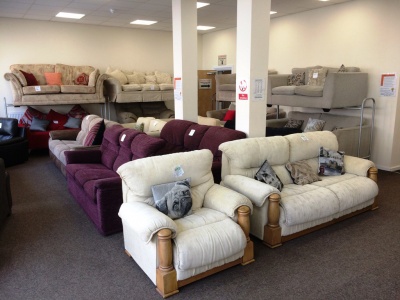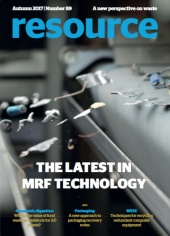Energising the social aspect of resource use
Leonie Butler spoke to Furniture Re-use Network CEO Craig Anderson about getting social aspects of sustainability recognised and working out what motivates people to do the right thing and reuse.
Born and bred in Pembrokeshire, Wales, and polished in Scotland, working in a job with furniture was in Craig Anderson’s stars. Yet, much like the rest of us, not necessarily with the ‘waste’ bit.

Indeed, after being acclaimed as British Junior Cabinet Maker for two years running and clutching a degree in Mechanical Engineering, Craig was planning on becoming a furniture designer. While studying, however, he became interested in renewables and started to turn his talents to designing wind turbines. It piqued his interest enough to go up to the University of Strathclyde to do a Masters in Energy and Environmental Systems.
There, design took a back seat and policy took centre stage: “I became interested in environmental and sustainable development. This led me into doing research during my Masters into why environmental policy wasn’t supported and the barriers to effectively developing and implementing it.”
The newfound interest led him to a fork in the road: “If you don’t change society from within then you’re not helping anybody but yourself. I wasn’t prepared to go into engineering for big business or go offline and hug a tree. I wanted something straight down the middle.”
A move down to Bristol and a meeting with the SOFA Project led to a job in researching waste policy and practice to support the growth of reuse in the Avon area. While there, he happened upon a then little-known piece of policy called the WEEE Directive and sealed his fate: “[It] had just been proposed by European Parliament and I said ‘this is an issue that could have an impact on the whole reuse sector, not just one organisation’.

“All those people out there who were fixing appliances and were reliant upon donations were about to be hit by EU policy that would change everything for them. A very technical directive that would have a huge impact on society’s needs and the excluded consumer.
“All of a sudden legislation was going to come in and the products would all go into a specific waste stream and get chewed up for recycling. So, I raised the necessary funds, and approached the Furniture Re-use Network and said ‘something needs to be done to help build the backbone of this sector’.”
The FRN took him on and he got stuck in with establishing standards for the reusers to work to, professionalising the sector. Along with some other forward-thinking people in Europe, he ensured that reuse was written into the WEEE Directive. “We had to ensure that the Directive came about with recognition of reuse, and we tried to get a bit of the social and economic agenda into the directive as well. It didn’t work then, but this is where the wider sustainability agenda and the circular economy is now heading.”
Today, with an OBE under his belt, the FRN currently has around 200 members with nearly 350 shops and outlets that reach out to vulnerable people in need of furniture and jobs while diverting waste from landfill through reuse. It’s an inspiring model. And it comes down, in the most part, to Craig’s ability to think commercially and develop FRN’s own quality assurance systems while holding onto the bottom line.
Having little luck with creating partnerships with local authorities, Craig instead turned his attention to the retail sector, which has been more open to innovation, and by mirroring its social concern with the activity of a corporate, the FRN has been able to make profitable partnerships between its trading subsidiary, FRN Enterprises, and John Lewis, Dixons Carphone and IKEA, amongst many others. “Retailers have been taking back white goods because of the scrap value for some time, but there’s never been a value to furniture, until the CSR impact and value to their customers was considered. Across the whole of the UK, about 1,000 WEEE items a week are being processed by FRN Enterprises. But now, we also have a UK-wide service with IKEA and John Lewis for the take-back of furniture – mattresses, sofas, the lot – from when they deliver new. They charge the customer, but the customer then doesn’t have to wait for the local authority bulky waste van to turn up or for one of the charities to turn up. It’s a small cost and then they pay us to take the product from them.” It’s a model that has seen the third sector organisation go from strength to strength.

Of course, in an ideal world where extended producer responsibility applied to furniture, we would hopefully see more manufacturing of new products made out of recycled materials, products being made to last and be easily repairable. But in the meantime, Craig advises that better and more progressive policies are needed to support reuse and the resource sector as a whole: “I suggest the waste sector needs to stop waiting around for the next policy decision to come through and, instead, take the lead in developing its own market driven services, but to do that we can’t just wait for the circular economy principles from policy, you have to work with the actuators which are the retailers and the manufacturers and most importantly the consumer who perhaps will not welcome the upheaval in how they consume.
“I think that the circular reuse principle, now it’s finally getting noticed, is a good foundation of the circular economy. You lease cars, so I think leasing household goods like furniture is a specific area of where the circular economy could be built. In fact, it is something that is already being talked about at retail level”. The FRN is already one step ahead, with some members leasing brand new furniture to housing associations to then reuse once first use has finished.
 This article was taken from Issue 89
This article was taken from Issue 89What’s more, the waste from the production of these new products has led the FRN to develop its own product line, new beds made from end of line materials. “We need to supply new beds because we can’t get enough second-hand beds of reasonable quality to service all the families that need them. With the materials that the manufacturer has left over, mainly on the textile covering and the wadding, we’re going to produce our own line of beds.”
The next phase of FRN’s development involves working out why exactly people donate items – is it because of waste reduction, tackling climate change, alleviating poverty, job creation or simply convenience? “Our plan is to raise awareness of the benefits of reuse. It’s what we want to do, and it is what our members have asked us to do. We want donors, members of the public, to understand that there is much more value in their unwanted sofa, cooker, dishwasher than simply ‘giving to charity’. We want people to realise that by donating their unwanted furniture they are saving £100s for a local family that could spend that saving on other essentials. We want people to realise that they are also supporting their chosen charity, the FRN member, in continuing its activities in the local area, be it preventing homelessness, supporting people with mental health needs or keeping someone in a job.
“We want every donation to have a social value as well as an environmental value. We believe a first step towards this is online by developing the digital technology to support these donations and understanding their social and environmental benefits.”
For FRN members it’s about all three factors – poverty alleviation, creating jobs and saving the environment. And for anyone involved in the resources sector, it’s a motivating tale.






